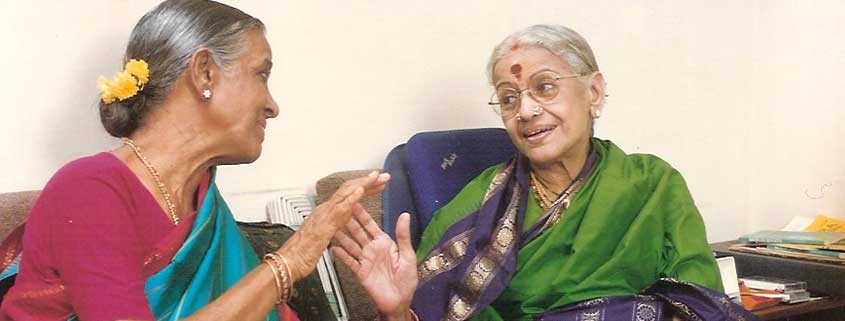Sruti Magazine, Issue 144, Sep 1996
Sruti requested Sangeeta Kalanidhi MANI KRISHNASWAMI to interview Sangeeta Kalanidhi M.S. Subbulakshmi for this special feature. After greeting MS, she asked eight questions and at the end asked for the blessings of MS and her husband T. Sadasivam.
Sruti offers you respectful felicitations on your birthday.
Our grateful thanks to Sruti and its readers for their affectionate felicitations to Mama and me on our birthdays. You know he is completing 94 on 15 September, according to the Indian calendar.
Do you remember when you gave your first recital?
When I was 10 years old, I was asked to sing at the wedding of a Saurashtra friend of the family in Madurai. As a little girl I was naturally shy, but also thrilled to be the centre of attraction amidst the glitter of bright lights on that occasion.
Can you name the great masters who inspired you?
My mother, of course, but other great maha vidwans like Sree Dakshinamurthy Pillai have also been a source of inspiration to me from my childhood.
What according to you are essential in an artist to become a success professionally?
Humility and the attitude to learn at any stage of our life.
What should an artist avoid?
Controversy with contemporaries.
Can you say a few words about Sadasivam Mama’s role in your musical career?
He has been everything for me since I came under his influence.
Here Mama intervenes and says: “Some people think that it was because of my vast contacts in public life, Subbulakshmi shot into fame. It is absolutely wrong. I restricted my role to shaping the quality of her music and talent. It was just by the sheer merit of her own art and personality, not to speak of her rigorous practice, that Kunjammal came up the ladder of fame. Even today at 80 she practises music like a young student for at least three hours every day.
Will you say something about the great accompanists you have had in your career?
Violin giants like Mysore T. Chowdiah, Tiruvalangadu Sundaresa Iyer and mridanga masters like T.K. Murthy have accompanied me in my concerts. Once in a private concert, the late Palakkad Mani Iyer played the mridangam for me and, on another occasion, Chembai Vaidyanatha Bhagavatar played the violin when the scheduled artist did not turn up on time. Young artists like R.K.Sriramkumar (violin), and K.V.Prasad (mridangam) are accompanying me in my concerts now. They all had and have their good points about them. None of them has been a hindrance to me on the platform or outside. I always cherish happy memories about them.
Present-day musicians, especially the younger ones, are talented no doubt, but do you agree that it would be useful and in their interest if they listen to the music of the stalwarts of the past?
Nothing can be forced on anyone now, like in the past. The youngsters in the field of music seem to know much more on any subject than what we knew when we were their age. I think, on their own, they do listen to the music of their seniors with a discerning attitude. It is enough if they analysed and assessed themselves thoroughly and identified the strong points and individual characteristics of the stalwarts and did everything to develop them without of course compromising tradition and quality.
What is your advice to present-day musicians, especially lady artists?
I feel I am not that experienced to give advice to anyone, however young they are. But with the advantage of my advanced age I may say that our lady artists should not lose their identity of Indian womanhood, however famous they become in the field. As you will agree, there is no substitute for humility and hard work.
Personally I need your blessings and that of Mama ….
Blessings of Lord Balaji are there on you both in abundance, to which we add our prayerful good wishes.



